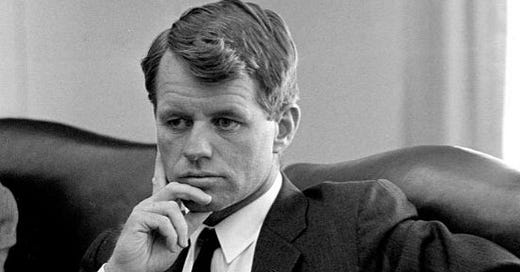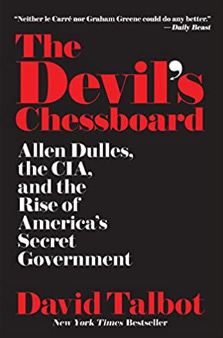A Shocking Fact about Bobby Kennedy's Assassination You Probably Don't Know
"...I have never said that Sirhan Sirhan killed Robert Kennedy,” medical examiner Dr. Thomas Noguchi bluntly stated in his 1983 memoir Coroner.
Recently I was drinking bourbon with a close friend who conceded he now harbored suspicions about the JFK assassination, stating he believes Lee Harvey Oswald was merely a patsy.
We discussed some of the stranger parts of the case: the failures of the Warren Commission, Harry Truman’s salvo against the CIA following the assassination, and the fact that other world leaders seem to have suspicions that there was more foul play at work than the commission wanted Americans to believe.
Then the conversation briefly pivoted to Bobby Kennedy’s assassination.
“That seems more like a freak thing to me. A lone nut,” he said. “Sirhan Sirhan obviously killed him.”
I nodded and sipped my bourbon. I knew some things about the JFK assassination and was learning more, but I knew little about RFK’s assassination beyond the basic details—he was shot at a Los Angeles hotel while campaigning for president in 1968.
I’ve learned a few more things since that bourbon-fueled discussion, and some of the details surrounding RFK’s assassination seem worth sharing.
Some of the details are merely circumstantial, like Jackie Kennedy telling Arthur Schlesinger Jr., the young Harvard historian who served in the JFK administration, that she had grave concerns about Bobby running for president.
“Do you know what I think will happen to Bobby?” Jackie told Schlesinger at a cocktail party. “The same thing that happened to Jack.”
Then there is the fact that Bobby made it clear to members of his inner circle that he was running for president to lay bare what he believed was a conspiracy surrounding his brother’s killing.
Then there’s the fact that people such as LBJ and CIA headquarters chief Bill Harvey hated RFK with a palpable intensity.
Interesting details, to be sure. But as I said, merely circumstantial.
The real shocker for me was the official view that a second gunman was present at the RFK assassination at the Ambassador Hotel on June 5, 1968.
‘I have never said that Sirhan Sirhan killed Robert Kennedy’
Unlike JFK’s assassination, Bobby Kennedy’s shooting death has not been analyzed under a microscope by the American public.
Nevertheless, I was stunned to learn that I had no idea that official reports suggested the likelihood of a second gunman. Dr. Thomas Noguchi, the former Chief Medical Examiner-Coroner for the County of Los Angeles, alluded to the likelihood of a second gunman in his official autopsy.
“Thus I have never said that Sirhan Sirhan killed Robert Kennedy,” Noguchi bluntly stated in his 1983 memoir Coroner.
I had no idea such a scenario—a second gunman—was considered a credible idea, let alone a likely one until I read David Talbot’s history The Devil’s Chessboard. In the book, Talbot explains the reasoning for the hypothesis.
“…numerous eyewitnesses—including one of them men who subdued Sirhan—insisted that the alleged assassin could not have fired the shot that killed Kennedy,” Talbot writes. “Sirhan was several feet in front of Kennedy when he began firing with his revolver. But the fatal shot—which struck RFK at point-blank range behind the right ear, penetrating his brain—was fired from behind.”
How don’t you know this? I asked myself.
I started asking other people I consider knowledgeable of such things; they too had no idea that many believed, credibly, that a second gunman was present.
Some people reading this article no doubt did know that the coroner who examined RFK never declared Sirhan the killer, and that eyewitnesses said the alleged assassin couldn’t have fired the killing shot. Great job if you did, but I’m more concerned with why these details of RFK’s death have been overlooked by history.
I’m not saying hidden by history, by the way. I’m saying overlooked. After all, these details aren’t exactly hard to find. You can find them on the Wikipedia page about Sirhan Sirhan, who in 2021 was recommended for parole by the California’s Board of Parole Hearing. (Parole was denied by Gov. Gavin Newsom, and the parole board has since reversed its recommendation.)
A Quest for Truth
But to return to my question: why have these details of RFK’s death have been overlooked by history?
It seems to me there is a concerted effort by many to ignore the inconvenient facts surrounding the deaths of JFK and RFK. To ignore the fact that the CIA continues to refuse to release all the documents related to the JFK assassination, year after year. To leave alone skeletons that have lingered in closets for decades.
One person not content with leaving those skeletons lie is RFK Jr., the son of Robert Kennedy and nephew to JFK. In 2018, while his actress wife Cheryl Hines waited in the car, RFK Jr. visited Sirhan in prison.
“I went there because I was curious and disturbed by what I had seen in the evidence,” Kennedy told the Washington Post. “I was disturbed that the wrong person might have been convicted of killing my father. My father was the chief law enforcement officer in this country. I think it would have disturbed him if somebody was put in jail for a crime they didn’t commit.”
Indeed.
RFK Jr. is currently running for president of the United States, and it’s precisely this kind of courage that has me excited about his candidacy.
It occurred to me RFK Jr. has very little to gain by running for president. He is already wealthy and famous, and has a beautiful wife and family. By running for president in a longshot bid, he can expect to be attacked by the full force of America’s institutions and labeled a nut and conspiracy theorist. What can he possibly gain?
Then it occurred to me: you cannot put a price tag on the truth. And that’s what he’s after.
Next week, I’ll explore another person who was at the center of the RFK assassination—literally—who believes a second gunman claimed the life of the young New York senator.






John Arthur Schlesinger must have been around 50 when he had that discussion with Jackie. Not ancient but not what I’d call young.